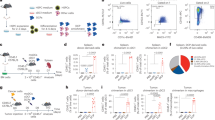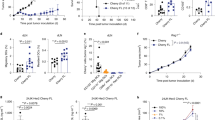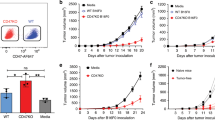Abstract
Stimulation of the antitumor immune response by dendritic cells (DC) is critically dependent on their tightly regulated ability to produce interleukin-12 (IL-12). To enhance this effect artificially, bone marrow (BM)-derived DC were genetically engineered to produce high levels of functional IL-12 by ex vivo infection with a recombinant defective adenovirus (AdCMVIL-12). DC-expressing IL-12 injected into the malignant tissue eradicated 50–100% well established malignant nodules derived from the injection of two murine colon adenocarcinoma cell lines. Successful therapy was dependent on IL-12 transfection and was mediated only by syngeneic, but not allogeneic BM-derived DC, indicating that compatible antigen-presenting molecules were required. The antitumor effect was inhibited by in vivo depletion of CD8+ T cells and completely abrogated by simultaneous depletion with anti-CD4 and anti-CD8 mAbs. Mice which had undergone tumor regression remained immune to a rechallenge with tumor cells, showing the achievement of long-lasting systemic immunity that also was able to reject simultaneously induced concomitant untreated tumors. Tumor regression was associated with a detectable CTL response directed against tumor-specific antigens probably captured by DC artificially released inside tumor nodules. Our results open the possibility of similarly treating the corresponding human malignancies.
This is a preview of subscription content, access via your institution
Access options
Subscribe to this journal
Receive 12 print issues and online access
$259.00 per year
only $21.58 per issue
Buy this article
- Purchase on Springer Link
- Instant access to full article PDF
Prices may be subject to local taxes which are calculated during checkout




Similar content being viewed by others
References
Steinman RM . Dendritic cells. In: Paul WE (ed) . Fundamental Immunology Lippincott-Raven: Philadelphia 1999 547–573
Banchereau J, Steinman RM . Dendritic cells and the control of immunity Nature 1998 392: 245–252
Hart DNJ . Dendritic cells: unique leukocyte populations which control the primary immune response Blood 1997 90: 3245–3287
Inaba K et al. Generation of large numbers of dendritic cells from bone marrow cultures supplemented with granulocyte–macrophage colony-stimulating factor J Exp Med 1992 176: 1693–1702
Mayordomo JI et al. Bone marrow derived dendritic cells pulsed with synthetic tumor peptides elicit protective and therapeutic antitumor immunity Nature Med 1995 1: 1297–1302
Sallusto F, Lanzavecchia A . Efficient presentation of soluble antigen by cultured human dendritic cells is maintained by granulocyte–macrophage colony-stimulating factor plus interleukin-4 and downregulated by tumor necrosis factor alpha J Exp Med 1994 179: 1109–1118
Paglia P, Chiodoni C, Rodolfo M, Colombo MP . Murine dendritic cells loaded in vitro with soluble protein prime cytotoxic T lymphocytes against tumor antigen in vivo J Exp Med 1996 183: 317–322
Boczkowski D, Nair SK, Snyder D, Gilboa E . Dendritic cells pulsed with RNA are potent antigen-presenting cells in vitro and in vivo J Exp Med 1996 184: 465–472
Specht J et al. Dendritic cells retrovirally transduced with a model antigen gene are therapeutically effective against established pulmonary metastases J Exp Med 1997 186: 1213–1221
Nair SK, Snyder D, Rouse BT, Gilboa E . Regression of tumors in mice vaccinated with professional antigen-presenting cells pulsed with tumor extracts Int J Cancer 1997 70: 706–715
Gong J et al. Reversal of tolerance to human MUC1 antigen in MUC1 Transgenic mice immunized with fusions of dendritic and carcinoma cells Proc Natl Acad Sci USA 1998 95: 6279–6283
Gong J et al. Induction of antigen-specific antitumor immunity with adenovirus-transduced dendritic cells Gene Therapy 1997 4: 1023–1028
Song W et al. Dendritic cells genetically modified with an adenovirus vector encoding the cDNA for a model antigen induce protective and therapeutic antitumor immunity J Exp Med 1997 186: 1247–1256
Rescigno M et al. Bacteria induced neo-biosynthesis, stabilization, and surface expression of functional class I molecules in mouse dendritic cells Proc Natl Acad Sci USA 1997 95: 5229–5234
De Smedt T et al. Regulation of dendritic cells numbers and maturation by lipopolysaccharide in vivo J Exp Med 1996 184: 1413–1424
Sparwasser T et al. Bacterial DNA and immunostimulatory CpG oligonucleotides trigger maturation and activation of murine dendritic cells Eur J Immunol 1998 28: 2045–2054
Roake JA et al. Dendritic cell loss from nonlymphoid tissues after systemic administration of lipopolysaccaride, tumor necrosis factor, and interleukin-1 J Exp Med 1995 181: 2237–2247
Caux C et al. Activation of human dendritic cells through CD40 cross-linking J Exp Med 1994 180: 1263–1272
Zitvogel L et al. Therapy of murine tumors with tumor peptide-pulsed dendritic cells: dependence on T cells, B7 costimulation, and T helper cell 1-associated cytokines J Exp Med 1996 183: 87–97
Tüting T et al. Autologous human monocyte derived dendritic cells genetically modified to express melanoma antigens elicit primary cytotoxic T cell responses in vitro: enhancement by cotransfection of genes encoding the Th1 biasing cytokines IL-12 and IFN-α J Immunol 1998 160: 1139–1147
Zitvogel L et al. IL-12-engineered dendritic cells serve as effective tumor vaccine ajuvants in vivo Ann NY Acad Sci 1996 795: 284–293
Qian C, Bilbao R, Bruña O, Prieto J . Induction of sensitivity to ganciclovir in human hepatocellular carcinoma cells by adenovirus-mediated gene transfer of herpes virus thymidine kinase Hepatology 1995 22: 118–123
Dietz AB, Vuk-Pavlovic S . High efficiency adenovirus-mediated gene transfer to human dendritic cells Blood 1998 91: 392–398
Couffinhal T et al. Histochemical staining following LacZ gene transfer understimates transfection efficiency Hum Gene Ther 1997 8: 929–934
Arthur JF et al. A comparison of gene transfer methods in human dendritic cells Cancer Gene Ther 1997 4: 17–25
Mazzolini G et al. Regression of colon cancer and induction of antitumor immunity by intratumoral injection of adenovirus expressing IL-12 Cancer Gene Ther 1999 (in press)
Zitvogel L et al. Cancer immunotherapy of established tumors with IL-12. Effective delivery by genetically engineered fibroblasts J Immunol 1995 155: 1393–1403
Huang AYC et al. The immunodominant major histocompatibility complex class I-restricted antigen of a murine colon tumor derives from an endogenous retroviral gene product Proc Natl Acad Sci USA 1996 93: 9730–9735
Matsuno K, Ezaki T, Kudo S, Uehara Y . A life stage of particle laden rat dendritic cells in vivo: their terminal division, active phagocytosis and translocation from liver to draining lymph J Exp Med 1996 183: 1865–1878
Celluzi C, Falo LD . Physical interaction between dendritic cells and tumor cells results in an immunogen that induces protective and therapeutic tumor rejection J Immunol 1998 160: 3081–3085
Albert ML, Sauter B, Bhardwaj N . Dendritic cells acquire antigen from apoptotic cells and induce class I-restricted CTLs Nature 1998 392: 86–89
Albert ML et al. Immature dendritic cells phagocytose apoptotic cells via avβ5 and CD36, and crosspresent antigens to cytotoxic T lymphocytes J Exp Med 1998 188: 1359–1368
Trinchieri G . Interleukin-12: a cytokine at the interface of inflammation and immunity Adv Immunol 1998 70: 83–243
Fernandez NC et al. High frequency of specific CD8+ T cells in the tumor and blood is associated with efficient local IL-12 gene therapy of cancer J Immunol 1999 162: 609–617
Coughlin CM et al. Tumor cell responses to IFNγ affect tumorigenicity and response to IL-12 therapy and antiangiogenesis Immunity 1998 9: 25–34
Grohman U et al. IL-12 acts directly on DC to promote nuclear localization of NF-κB and primes DC for IL-12 production Immunity 1998 9: 315–323
Grohman U et al. Dendritic cells, interleukin 12, and CD4+ lymphocytes in the initiation of class I-restricted reactivity to a tumor/self peptide Crit Rev Immunol 1998 18: 87–98
Fallarino F, Uyttenhove C, Boon T, Gajewski TF . Improved efficacy of dendritic cell vaccines and successful immunization with tumor antigen peptide-pulsed peripheral blood mononuclear cells by coadministration of recombinant murine interleukin-12 Int J Cancer 1998 80: 324–333
Leonard JP et al. Effects of single dose interleukin-12 exposure on interleukin-12-associated toxicity and interferon-γ production Blood 1997 90: 2541–2548
Ludewig B et al. Dendritic cells induce autoimmune diabetes and maintain disease via de novo formation of local lymphoid tissue J Exp Med 1998 188: 1493–1501
Cao X et al. Lymphotactin gene-modified bone marrow dendritic cells act as more potent adjuvants for peptide delivery to induce specific antitumor immunity J Immunol 1998 161: 6238–6244
Melero I et al. Monoclonal antibodies against the 4–1BB T cell activation molecule eradicate established tumors Nature Med 1997 3: 682–685
Prieto I et al. Simple strategy to induce antibodies of distinct specificity: application to the mapping of gp120 and inhibition of HIV-1 infectivity Eur J Immunol 1995 2: 877–883
Acknowledgements
We are grateful to Izaskun Gabari for her expert technical support and to Drs Lasarte and Borrás for peptide synthesis and helpful suggestions. We are grateful for the critical reading of the manuscript by Drs López-Botet, Perez-Diez and Santidrián. The first two authors have equally contributed to the experimental work. This work has been supported by grant SAF99–0039 from CICYT (Spain).
Author information
Authors and Affiliations
Rights and permissions
About this article
Cite this article
Melero, I., Duarte, M., Ruiz, J. et al. Intratumoral injection of bone-marrow derived dendritic cells engineered to produce interleukin-12 induces complete regression of established murine transplantable colon adenocarcinomas. Gene Ther 6, 1779–1784 (1999). https://doi.org/10.1038/sj.gt.3301010
Received:
Accepted:
Published:
Issue Date:
DOI: https://doi.org/10.1038/sj.gt.3301010
Keywords
This article is cited by
-
Tumor immunotherapy using adenovirus vaccines in combination with intratumoral doses of CpG ODN
Cancer Immunology, Immunotherapy (2011)
-
Gene therapy of liver cancer: an update
Journal Africain du Cancer / African Journal of Cancer (2011)
-
Immunotherapy for liver tumors: present status and future prospects
Journal of Biomedical Science (2009)
-
Evaluation of bioluminescent imaging for noninvasive monitoring of colorectal cancer progression in the liver and its response to immunogene therapy
Molecular Cancer (2009)
-
Influence of bevacizumab, sunitinib and sorafenib as single agents or in combination on the inhibitory effects of VEGF on human dendritic cell differentiation from monocytes
British Journal of Cancer (2009)



